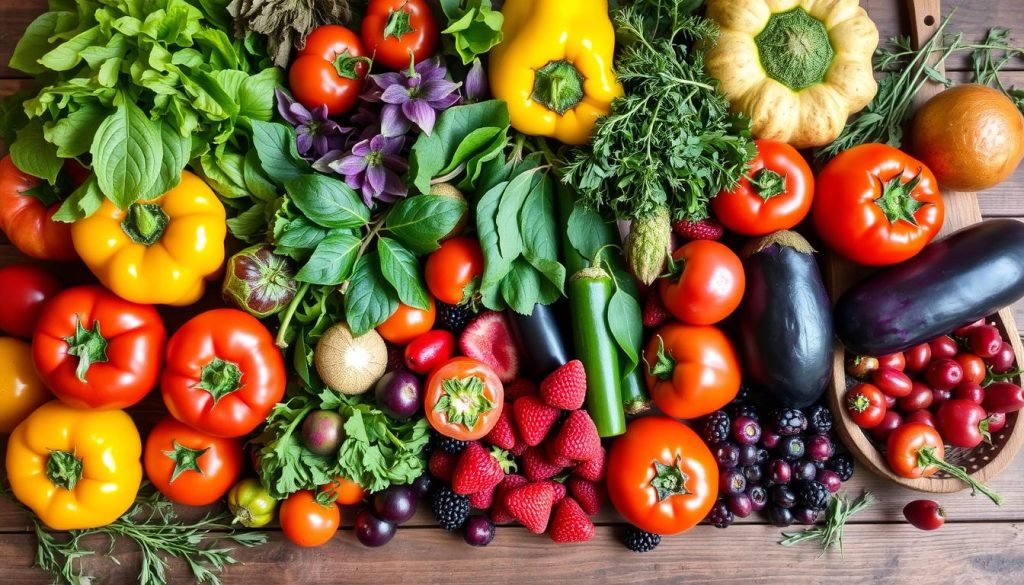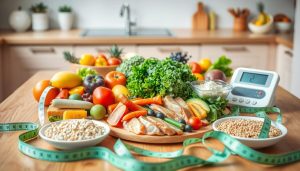Are you fed up with the cycle of dieting and quick fixes that leave you feeling defeated? You’re not alone in this struggle. The truth is, lasting weight loss is achievable through healthy eating habits that benefit both your body and mind. This guide will delve into effective strategies for shedding pounds and maintaining a healthy lifestyle, both today and in the future.
Key Takeaways
- Sustainable weight loss requires adopting healthy eating habits that can be maintained long-term.
- Incorporating nutrient-dense foods, practicing portion control, and achieving calorie balance are key to successful weight management.
- A balanced, plant-based diet rich in whole foods can provide the essential nutrients your body needs.
- Staying hydrated and increasing protein and fiber intake can help you feel full and satisfied.
- Setting realistic goals and celebrating small victories are crucial for long-term success.
The Importance of Sustainable Weight Loss
Reaching and keeping a healthy weight is vital for your overall health. The path to sustainable weight loss isn’t about fast fixes or fleeting diets. It’s about embracing lasting, healthy habits that benefit your body and mind over time.
Adopting Lifelong Healthy Habits
For lasting weight loss, focus on gradual, sustainable lifestyle changes. This means:
- Practicing mindful eating and understanding your hunger and fullness cues
- Adding more nutrient-rich, whole foods to your diet
- Finding fun physical activities to add to your daily routine
- Building a positive relationship with food and your body
By embracing these habits, you pave the way for long-term success. This approach avoids the pitfalls of short-term solutions that can lead to frustration and weight gain.
Start Losing Weight Today! Click Here to Get Real Results
Avoiding Fad Diets and Quick Fixes
Fad diets and quick fixes may promise fast results, but they rarely address the core behaviors and nutritional needs for lasting weight management. These methods are often unsustainable, causing yo-yo dieting, nutrient deficiencies, and a harmful relationship with food.
Instead of chasing quick fixes, aim for gradual, lasting lifestyle changes. This approach not only helps you reach your weight loss goals but also enhances your overall health and well-being in the long term.
“Sustainable weight loss is not about quick fixes or drastic measures; it’s about adopting lifelong healthy habits that nourish your body and mind.”
The Mayo Clinic Diet: A Holistic Approach
The Mayo Clinic Diet is a comprehensive weight management program. It focuses on creating sustainable lifestyle changes. This approach, based on the 2020-2025 Dietary Guidelines for Americans, offers a holistic solution for weight loss and long-term health.
The Two Phases: “Lose It!” and “Live It!”
The Mayo Clinic Diet has two distinct phases. The “Lose It!” phase is for starting your weight loss journey. The “Live It!” phase helps you maintain your goal weight by adopting healthy habits.
- The “Lose It!” phase aims to create a calorie deficit. It focuses on nutrient-dense foods for rapid, yet sustainable weight loss.
- The “Live It!” phase transitions you to a balanced, long-term eating plan. This plan supports your overall well-being, as recommended by Mayo Clinic nutritionist Karen Zeratsky, RD, LD.
Focusing on Healthy Food Choices
Healthy food choices are at the core of the Mayo Clinic Diet. The program promotes whole, minimally processed foods that are rich in essential nutrients.
- Embrace a variety of vegetables, fruits, whole grains, lean proteins, and healthy fats. These foods nourish your body and support your weight loss goals.
- Limit added sugars, refined carbohydrates, and unhealthy fats. This is as outlined in the 3rd edition of “The Mayo Clinic Diet” edited by Donald D. Hensrud, MD, MPH.
- Supplement your diet with essential vitamins, minerals, and other nutrients. This is recommended by the Office of Dietary Supplements and the Academy of Nutrition and Dietetics.
By focusing on wholesome, nutrient-rich foods, the Mayo Clinic Diet empowers you. It helps you make sustainable lifestyle changes that support your weight loss journey and overall well-being.
Rethinking Dairy: A Controversial Topic
The debate on dairy’s role in a healthy diet has been ongoing for years. Dairy products are rich in calcium but also high in saturated fat, linked to heart disease risk. Many face lactose intolerance, causing digestive problems. Considering plant-based alternatives could aid in weight management and overall health.
The dairy industry has faced significant challenges. In 2015, 71% of dairy farmers’ income came from government subsidies, showing its dependency. Milk consumption peaked in 1946 with the National School Lunch Program’s introduction. However, it has declined, especially among people of color, due to lactose intolerance recognition in the 1960s.
In the 1970s and 1980s, experts advised moderation in dairy and animal fats consumption. This led to the National Dairy Promotion & Research Board’s creation in 1983. Funded by a portion of milk sales, it promoted dairy through campaigns like “Got Milk?” in the 1990s and early 2000s.
The global population’s growth highlights the need for sustainable, nutritious food. One-third of global greenhouse gas emissions are attributed to the food system, contributing to climate change and impacting future food production. Given dairy’s environmental impact and health concerns, reevaluating our dairy consumption is vital for a healthier, sustainable future.
“The dairy industry has rapidly industrialized over the last century, with one-third of global greenhouse gas emissions attributed to the food system. Rethinking our relationship with dairy is a crucial step towards a healthier and more sustainable future.”
Maximizing Nutrient Intake from Plant-Based Sources
Emphasizing plant-based nutrition and nutrient-dense foods can revolutionize your approach to sustainable weight loss. By choosing whole, unprocessed plant-based options, you fulfill your body’s nutritional needs. This supports your weight management goals effectively.
Calcium, Potassium, and Magnesium from Whole Foods
Minerals like calcium, potassium, and magnesium are vital for health. These nutrients are abundant in whole plant-based foods. Leafy greens, beans, lentils, and whole grains are prime sources.
- Leafy greens like kale, spinach, and collard greens are excellent sources of calcium and magnesium.
- Beans, lentils, and other legumes provide a wealth of potassium and magnesium.
- Whole grains, such as quinoa, brown rice, and oats, are rich in magnesium and other important minerals.
Vitamin D: The Sunshine Vitamin
Vitamin D, known as the “sunshine vitamin,” is crucial for bone health and immune function. Our bodies can synthesize vitamin D from sunlight. However, it’s also found in fortified plant-based products like non-dairy milk and some cereals.
| Nutrient | Plant-Based Food Sources |
|---|---|
| Calcium | Leafy greens, tofu, tempeh, fortified non-dairy milk |
| Potassium | Beans, lentils, sweet potatoes, bananas |
| Magnesium | Whole grains, nuts, seeds, leafy greens |
| Vitamin D | Fortified non-dairy milk, mushrooms, some cereals |
Incorporating a variety of nutrient-dense plant-based foods into your diet is key. This ensures your body gets the essential minerals and vitamins. These are crucial for your weight loss journey and overall health.

Portion Control and Mindful Eating
For a healthy weight, it’s vital to be mindful of portion sizes and how we relate to food. Portion control ensures we’re not consuming too many calories. Meanwhile, mindful eating helps us feel full and prevents mindless eating.
The DASH diet is known for its success in weight loss and reducing unhealthy obesity. Yet, adults struggle to stick to it. Adding mindful eating to DASH diet education could make a big difference in weight management.
Research shows mindful eating can tackle disordered eating, obesity, and diabetes. Yet, it’s not commonly used for heart-healthy diets like the DASH. Most eHealth apps focus on stress reduction, not diet behaviors.
The Mind Your Heart (MYH) program is a new way to merge DASH diet education with mindful eating online. It could help people adopt better eating habits for life.
| Key Findings from the MYH Program |
|---|
| – The MYH program covers nutrition and mindfulness topics, like balanced diets and meal planning. |
| – Participants showed better state mindfulness during meals, as seen in the State Mindfulness Scale. |
| – The program was a hit with working adults, with 16 finishing all study tasks. |
Looking ahead to 2025, promoting portion control and mindful eating is key. It will help tackle obesity, type 2 diabetes, and heart disease in the U.S. By teaching people to eat mindfully, we can support lasting health and weight management.
“Sustainable diets aiming at economic, environmental, and nutritional objectives can be effective in achieving healthy weight management.”
The Role of Physical Activity in Weight Management
Regular physical activity is essential for sustainable weight loss and overall health. It involves both structured exercise routines and daily movement. This balance helps maintain a healthy calorie intake, aiding in weight management. The goal is to find enjoyable activities that keep you motivated, such as strength training, dance, or outdoor activities.
Finding Joyful Exercise Routines
Exercise is not a one-size-fits-all solution. It’s important to explore various activities until you find ones that bring you joy. This might include:
- Strength training, such as weightlifting or bodyweight exercises
- Cardio activities like running, cycling, or swimming
- Dance classes or high-energy group fitness sessions
- Outdoor pursuits like hiking, rock climbing, or team sports
Choosing activities that are fun and energizing makes it easier to maintain a regular exercise routine. This leads to sustainable weight management.
Incorporating More Movement Throughout the Day
Structured exercise is just one part of the equation. Small changes to increase daily movement can also significantly impact weight management. Consider:
- Taking the stairs instead of the elevator
- Going for regular walking breaks during the workday
- Choosing to stand or pace while on the phone
- Engaging in light physical activity during commercial breaks while watching TV
These simple actions can boost your physical activity levels. This contributes to a healthy calorie balance and supports your weight management goals.
| Physical Activity Type | Benefits for Weight Management | Recommended Duration |
|---|---|---|
| Aerobic Exercise | Helps burn calories, improves cardiovascular health | 150-300 minutes per week |
| Strength Training | Builds muscle, boosts metabolism, supports fat loss | 2-3 sessions per week |
| Daily Movement | Increases overall calorie expenditure, supports an active lifestyle | Aiming for 10,000 steps per day |
Finding the right balance between structured exercise and daily movement is crucial. A combination of these approaches can lead to successful and sustainable weight management.
Calorie Balance: The Key to Weight Loss
Weight loss is not just about cutting calories. It’s about finding the right balance between what you eat and how much energy you use. This balance is crucial and is tied to your Total Daily Energy Expenditure (TDEE).
Your TDEE is the total calories your body burns daily. It includes your basal metabolic rate and daily activity. Knowing your TDEE helps you set a calorie target for a calorie deficit. This deficit is key to weight loss.
Start Losing Weight Today! Click Here to Get Real Results
Creating a Sustainable Calorie Deficit
Studies show a 500-calorie deficit can help with weight loss, but results vary. A calorie deficit means you burn more calories than you eat. For many, a 300–500 calorie deficit daily can lead to losing 0.5 kg (1.1 pounds) weekly.
To find your TDEE, use formulas like the Harris-Benedict Formula. It considers your activity level. By monitoring your calorie intake and activity, you can create a lasting calorie deficit and reach your weight loss targets.
| Metric | Value |
|---|---|
| Recommended Calorie Deficit | 300-500 calories per day |
| Potential Weight Loss | 0.5 kg (1.1 pounds) per week |
| Basal Metabolic Rate (BMR) Formulas | Harris-Benedict Formula |
| Dietary Guidelines Recommendation | Diet rich in fruits, vegetables, whole grains, lean proteins, and low-fat dairy |
| Physical Activity Guidelines | 150–300 minutes of moderate intensity or 75–150 minutes of vigorous intensity exercise weekly, coupled with muscle-strengthening activities on two or more days |
By focusing on calorie balance and making small, achievable changes, you can reach your weight loss goals. This approach leads to lasting success.
Healthy Eating Habits for Sustainable Weight Loss Now and in 2025
Achieving sustainable weight loss is more than just losing weight quickly. It’s about adopting healthy eating habits for life. A balanced, nutrient-rich diet and regular exercise create a future-proof lifestyle. This supports your long-term weight management goals.
The Mayo Clinic Diet takes a holistic view on sustainable weight loss. In the “Lose It!” phase, you can lose up to 6 to 10 pounds (2.7 to 4.5 kilograms) in two weeks. Then, in the “Live It!” phase, you can lose 1 to 2 pounds (0.5 to 1 kilograms) per week until you reach your goal.
The Mayo Clinic Diet’s success hinges on healthy food choices. Eating vegetables, fruits, whole grains, nuts, beans, fish, and healthy fats is key. This reduces the risk of diabetes, heart disease, high blood pressure, and sleep apnea.
Alongside a nutritious diet, the Mayo Clinic Diet promotes at least 30 minutes of daily physical activity. Longer sessions offer more health benefits and aid in sustainable weight loss. Adding more movement daily can lower heart and circulatory disease risks by up to 35%.
The essence of healthy eating habits for sustainable weight loss is a holistic approach. It combines a balanced diet, regular exercise, realistic goals, and celebrating small victories. Embracing this lifestyle starts a journey towards a healthier, more vibrant you.

“Maintaining even a small weight loss is beneficial for long-term health.”
Hydration: The Overlooked Nutrient
Proper hydration is a key element of a healthy lifestyle and weight management. Drinking enough water supports various bodily functions, including appetite regulation and metabolism. It’s also crucial to reduce sugar-sweetened beverages, which are high in liquid calories. This helps maintain a healthy calorie balance and supports sustainable weight loss.
Reducing Liquid Calorie Intake
Currently, 1 in 3 people globally are malnourished, and by 2030, this number could rise to 1 in 2. Diet is the leading cause of poor health worldwide. The overconsumption of sugar-sweetened beverages is a major issue, as they provide liquid calories with little to no nutritional value.
To achieve your weight loss goals and maintain health, it’s vital to cut down on sugar-sweetened drinks like soda, sports drinks, and juice. These beverages are loaded with added sugars, which can cause weight gain, metabolic problems, and other health issues. Opt for water instead, which is calorie-free and crucial for optimal bodily functions.
| Beverage | Calories per Serving |
|---|---|
| Soda (12 oz can) | 140-160 calories |
| Sports Drink (20 oz bottle) | 120-130 calories |
| Fruit Juice (8 oz glass) | 110-150 calories |
| Water | 0 calories |
Switching to water from sugary drinks can greatly reduce your liquid calorie intake. This supports your overall health and weight loss efforts. Remember, staying hydrated is a simple yet powerful way to enhance your wellness journey.
“Proper hydration is essential for weight management and overall health. Replacing sugary beverages with water can make a significant difference in your calorie intake and support your weight loss goals.”
Increasing Protein and Fiber for Satiety
Weight loss hinges on creating a calorie deficit while maintaining satisfaction and energy. Focusing on protein and fiber-rich foods is a key strategy. These foods promote satiety, aiding in adherence to weight loss plans.
Protein’s slow digestion rate makes it a crucial component for long-lasting fullness. This contrasts with carbohydrates and fats, which digest more quickly. A diverse intake of protein sources, including lean meats, eggs, and legumes, supports a balanced diet for weight loss.
Fiber also plays a vital role in sustainable weight loss. Foods high in fiber, such as beans and whole grains, regulate digestion and blood sugar. This leads to increased satiety and prevents blood sugar spikes that trigger cravings or energy crashes.
| Nutrient | Recommended Daily Intake | Benefits for Weight Loss |
|---|---|---|
| Protein | 1.3 grams per kilogram of body weight | Helps maintain muscle mass, promotes feelings of fullness |
| Fiber | 25-30 grams per day | Aids digestion, controls blood sugar levels, contributes to satiety |
Emphasizing nutrient-dense, high-protein, and high-fiber foods leads to a balanced diet. This diet supports weight management goals by fostering satisfaction and energy. It empowers you to adopt sustainable lifestyle changes for lasting weight loss success.
“Incorporating more protein and fiber into your diet can be a game-changer for weight loss. These nutrients work together to keep you feeling full and satisfied, making it easier to stick to your healthy eating plan.”
Setting Realistic Goals and Tracking Progress
Setting weight loss goals that are achievable and tracking your progress regularly is vital. It keeps you motivated and helps you make lasting sustainable lifestyle changes. It’s important to aim for realistic targets that fit your needs and preferences, rather than setting unattainable goals.
Breaking down your weight loss goals into smaller, achievable milestones is a smart strategy. Focus on weekly or monthly targets, like reducing body weight or increasing physical activity. Celebrating these small victories helps reinforce the positive changes and keeps you motivated to continue your healthy eating journey.
Celebrating Small Victories
As you strive for your weight loss goals, make sure to acknowledge and appreciate your progress, no matter how small. This could include:
- Hitting your daily step target
- Noticing improvements in how your clothes fit
- Experiencing increased energy levels or better sleep
- Incorporating more nutrient-dense, whole foods into your diet
Recognizing these small victories can give you the motivation to keep going. It helps you maintain the sustainable lifestyle changes necessary for long-term weight management success.
To improve your progress tracking, consider using online tools like the NIH Body Weight Planner. It helps you tailor your calorie and physical activity plans to meet your weight loss goals. Remember, celebrating your achievements, no matter how small, is key. Stay committed to the healthy habits that support your journey.
Conclusion
In conclusion, adopting healthy eating habits is key to sustainable weight loss. Focus on nutrient-dense, whole foods and practice portion control. Regular physical activity is also crucial. By creating a balanced lifestyle, you can achieve and maintain your weight management goals.
Remember to be patient and celebrate your progress. Stay committed to nourishing your body and mind for lasting health and vitality. This approach ensures a sustainable path to wellness.
The article highlights the importance of establishing lifelong habits for healthy eating and sustainable weight loss. Avoid fad diets and embrace a holistic approach. This includes nutritious food choices, portion control, and regular physical activity.
By rethinking your relationship with dairy and maximizing nutrients from plant-based sources, you can optimize your health. Staying hydrated is also essential for overall well-being.
As you start your journey towards healthy eating and sustainable weight loss, remember that progress is not always linear. Celebrate the small victories and stay consistent. Trust the process and dedicate yourself to positive change.
With dedication and a positive mindset, you can create lasting transformations. These changes will benefit you not just now, but in the years to come.
Start Losing Weight Today! Click Here to Get Real Results




